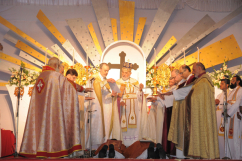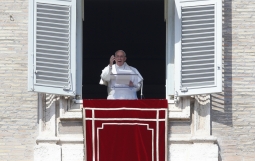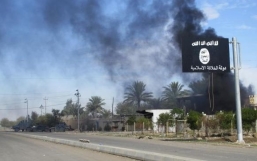The ancient Iraqi city of Nimrud that was looted and bulldozed by Islamic State is vital to the cultural identity of Assyrian Christians, an expert has told Christian Today.
Nineveh Yakou, an Assyrian Archaeologist and Director of Cultural Heritage and Indigenous Affairs at A Demand for Action, said the damage to Nimrud signifies the "destruction of world heritage" and is likely to be irreparable.
There is no word yet on the extent of the attack, but a source told Reuters the city was razed to the ground by militants. Yakou likened it to the recent destruction of a museum in Mosul, as well as what was thought to be Jonah's tomb last year. She branded ISIS' actions "senseless" and said we can expect "absolute and irreparable damage to the site and remaining reliefs and sculptures" in Nimrud.
"The likelihood is they will sell what reliefs they could remove on the antiquities market, as they have been doing to fund their campaign of terror since their occupation of Mosul. They are systematically targeting Iraqi heritage sites, in particular Assyrian sites, and I don't believe they will stop until Iraq has been levelled," Yakou said.
"Iraq is littered with ancient sites and artefacts dating back more than 7,000 years. They hold great value to world history, not just to Iraqis. How much more destruction needs to take place before action is taken to stop them?"
Nimrud dates back to the Middle Assyrian period and was considered to be one of the most important cities in the Assyrian empire. Located south of Mosul, which was overrun by IS militants last June, it was established as the capital during the Neo Assyrian period under King Ashurnasirpal II. Many of the carvings from his palace in the city are now on display at the British Museum in London.
Nimrud has until now been one of the most preserved sites in the region, though subject to some neglect and looting in the past two decades. It is inscribed on the UNESCO World Heritage list, and Director General Irina Bokova has already condemned the attack. He said in a statement: "We cannot remain silent. The deliberate destruction of cultural heritage constitutes a war crime."
The city's historical significance and links to the modern Assyrian cultural identity are second to none, Yakou added. "[It] is to the Assyrians the equivalent of the Colosseum to the Italians and the Pyramids to the Egyptians."
Axel Plathe, director of the UNESCO Office for Iraq, has also condemned the incident as "another appalling attack on Iraq's heritage," while Iraqi archaeologist Dr Lamia al-Gailani told the BBC that Islamic State is "erasing our history". Yakou agrees.
"This site is part of the Cradle of Civilisation. The world we know today and our technological advancements have their roots in the land once known as Mesopotamia (modern Iraq). We are witnessing the destruction of world heritage," she explained.
She said she is "completely distraught" by the attack, both as an Assyrian and an archaeologist, and called for urgent action form the international community to prevent further destruction. "Who would have known that the monuments and artefacts the ancient Assyrians built would be used to fund the annihilation of their race?"
"This is not only a cultural heritage crisis. This is a humanitarian crisis of the highest state of emergency. ISIS are attempting to wipe out the people of Iraq and their history. This is an undeniable cultural and ethnic cleansing," Yakou added.
"Assyrians globally identify with these sites. Iraqis in general identify with these sites. The Assyrians are not visitors, or guests or immigrants to the land. We are the indigenous people.
"We are a nation in mourning. But the entire world should be mourning this loss."
News of the attack broke late last night after militants began demolishing the site on Thursday. The government said heavy machinery was used by militants, who stole artefacts dating back 13 centuries BC.
"They violated the ancient city of Nimrud and bulldozed its ancient ruins," Iraq's Ministry of Tourism and Antiquities said in a statement.
"ISIS continues to defy the will of the world and the feelings of humanity."

















